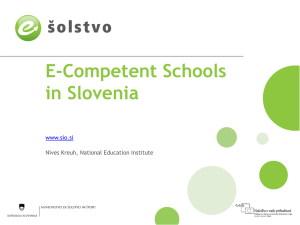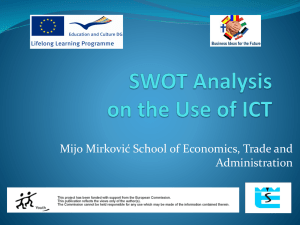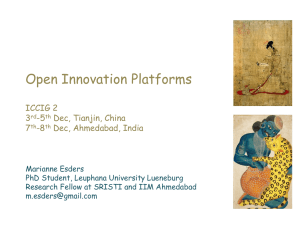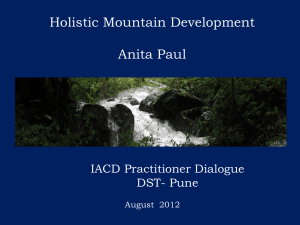How can grasshoppers change ICT practices?
advertisement
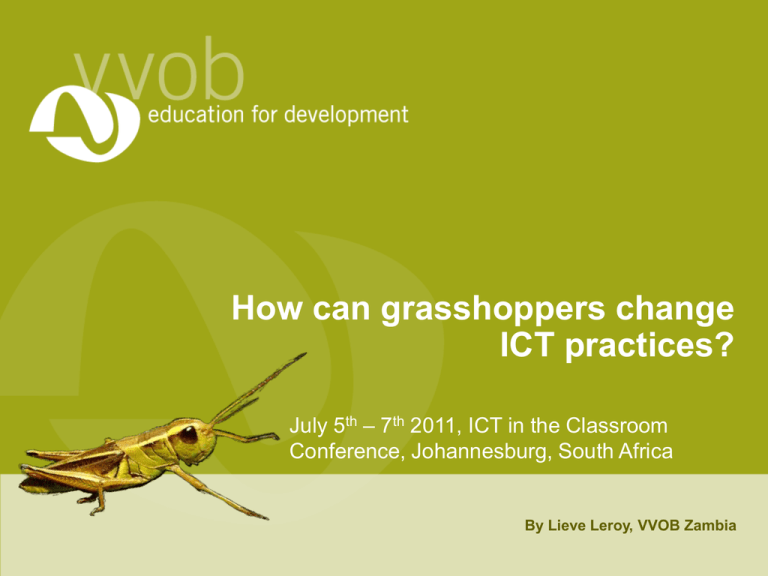
How can grasshoppers change ICT practices? July 5th – 7th 2011, ICT in the Classroom Conference, Johannesburg, South Africa By Lieve Leroy, VVOB Zambia Case • You attend a workshop, but upon returning to your own workplace, you fail to implement the lessons learned. • Your colleague just got his ICDL certificate, but still has a classroom full of chalk and talk. Ever experienced something like this? Outcomes By the end of the session delegates will: • Have reflected on capacity building in ICT, inclusive of integration in class/work practices. • Have exchanged good ideas and go home with a basket of tips and tricks. • Have a good understanding of the Grassroots approach and have reflected on the duplicability of it. Getting started • Think of an ICT tool (Web 2.0) which inspired you during the last year. • What was the trigger that made you start using it? Speed dating set up Plenary More questions • Have you ever succeeded in motivating a/some colleague(s) to use an ICT tool? • What was the key to success? Think Pair Share Our tool box to success • Let’s make an inventory Some guidelines • ICT application in the classroom: – requires staff development – implies change, which might trigger resistance • Highly effective ways of staff development are: discussing, coaching, mentoring, observing and developing others are highly effective • comfort risk danger: – Feasible but challenge – Support (time, materials, coach) – Confidence Our tool box to success • Reflect on the guidelines and relate those to our tool box: how effective are our approaches The reality: Zambia The reality: Zambia The reality: Zambia Grassroots Zambia “Learn to use & Use to learn“ • Based on Grassroots TU Delft, The Netherlands • Done in Zambia, community schools and colleges of education Grassroots • Staff at all levels can submit a proposal for a small scale initiative to enhance the introduction of ICT, or innovative methods of teaching at school/college (bottom up) • Expert support/guidance over the duration of the project (technical and educational support) • Reward for a successful implementation • Dissemination in a good practices seminar and publication of good practices Why grassroots? • Stimulate lecturers, with little or no experience with ICT, to get a feeling for using ICT • Increase the use of ICT in education in the institute Why is it successful: • Lecturer is the owner of the idea; feels empowered • Stimulating creativity of lecturers • Enthusiasm and commitment • Stimulates peers; appealing concept • Students are immediately benefiting Process Approval of proposals planning • Fine tuning proposals • Feasibility • Getting started implementation • Guidance and mentoring • Meetings with peers Celebration/ dissemination • Good practices • Reward • Writing Tales of the Grasshoppers In Zambia: two rounds 5 thematic groups: • Find, search, collaborate • Audi, visual and video learning • Gadgets and tools • Language and Mathematics • Hands on ICT “Those who make a distinction between education and entertainment don't know the first thing about either.“ -- Marshall McLuhan Expert Groups Agreement Working Together The role of the mentor in grassroots is: • Give feedback • Give advice on how to balance responsibilities, set professional priorities and action plans. • Help to find technical/subject matter inputs and resources. • Empower participants to take responsibility for their own project, experience and learning. • Organise meetings with the ‘peer group’. • Create linkages with colleagues from other institutions. Getting started • How would the concept of grassroots project be transferable to your situation? • Discuss your own challenges in the use of ICT in your organisation/class. Come up with a grassroots proposal to solve this situation • http://www.icto.tudelft.nl/en/ongoingprojects/grassroots/tu-delft-grassroots/ • http://grassrootszambia.webs.com/ • http://www.vvobzambia.blogspot.com/ • http://www.slideshare.net/bart.cornille/tab-1-tales-of-thegrasshoppers With contributions from presentations by Kristin Smets (VVOB Brussels) and Leonie Meijerink e. a. (VVOB Zambia) literature • • • • • • • • • • Bubb, S., Earley, P. (2007). Leading and managing continuing professional development (2nd ed.). London: Paul Chapman Publishing. Bubb, S. Earley, P., Leading staff development for school improvement, School Leadership and Management, Vol 29, No 1, February 2009, pp. 23-37. Fullan, M. (2007), The New Meaning of Educational Change (4th ed.), London: Routledge. Leithwood, K., Mascall, B., Strauss, T., Sacks, R., Memon, N. and Yashkina, A. (2007) Distributing Leadership to Make Schools Smarter: Taking the Ego Out of the System. Leadership and Policy in Schools, 6:1, pp.37-67. Marzano, R.J. (2003), What Works in School: Translating Research into Action, Alexandria, VA: ASCD. Marzano, R.J., Waters, T. and McNulty, B.A. (2005), School Leadership that Works: From Research to Results, Alexandria, VA: ASCD. Meijerink, L., Dopper, S., Cornille, B., Duplicability of Grassroots concept to inspire educators to use ICT in education, eLearning Africa Conference, 26 May 2010, Zambia. Pont, B., Nusche, D. and Moorman, H. (2008), Improving School Leadership, Volume 1: Policy and Practice, Paris: OECD. Reeves, D. B. (2009). Leading change in your school: How to conquer myths, build commitment, and get results. Alexandria, VA: ASCD. Schollaert, R. and Leenheer, P. (Eds.) (2006), Spirals of Change. Educational change as a driving force for school improvement, Leuven: Lannoo Campus.





